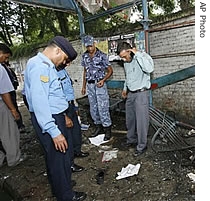2007年VOA标准英语-Obscure Groups Claim Responsibility for Nepal B(在线收听)
New Delhi
03 September 2007
Two ethnic groups from southern Nepal are claiming responsibility for Sunday's deadly bombings in the Himalayan nation's capital. VOA's Steve Herman reports from our South Asia bureau in New Delhi.
 |
| Nepalese police officials inspect a blast site at a busy market place in Kathmandu, Nepal, 02 Sept 2007 |
Officials and Nepalese media identified the groups as the Terai Army and the Nepal People's Army.
The Terai Army is threatening more bombings unless its demands for a separate state in the south are met. The Terai plains of southern Nepal are primarily inhabited by the Madheshis, who are of Indian origin. They have long complained of discrimination.
The Indian government has condemned the bombings.
"It is despicable, it is horrible. It is horrendous and it has to put down with the firmest hand," said Abhishek Manu Singhvi, spokesman for India's governing Congress Party. "Terrorism cannot be compromised with. It does not matter whether it occurs in India, whether it occurs in Nepal, whether it is ethnic, whether it is social, whether it is cultural, whether it is political."
The Nepal Peoples' Army says it carried out the attacks as part of its campaign to abolish the monarchy and declare Nepal a republic.
That is a demand shared by the Maoists, who are now part of the interim government. The communist group ended a 10-year civil war against the government last year and agreed to join the electoral process. The decade-long insurgency left 13,000 people dead.
Nepalese officials are skeptical that either group carried out the relatively sophisticated bombings. They note there are 18-armed groups trying to derail national elections set for November 22.
Nepal's government has promised the country's 40 ethnic minority groups they will enjoy more rights under the new constitution, to be drafted after the November vote.
The election will select a constituent assembly, which will likely determine the fate of Nepal's unpopular monarch, King Gyanendra, who has already been stripped of most of his powers.
The United Nations and other observers warn the security situation in some parts of Nepal could jeopardize carrying out credible polling.